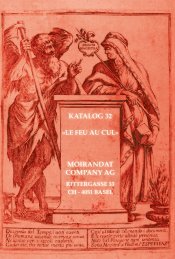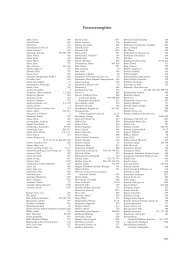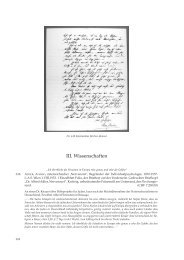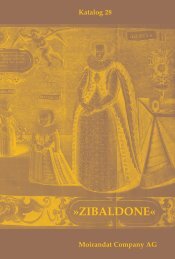I. Literatur
I. Literatur
I. Literatur
Erfolgreiche ePaper selbst erstellen
Machen Sie aus Ihren PDF Publikationen ein blätterbares Flipbook mit unserer einzigartigen Google optimierten e-Paper Software.
„nothing more horrible can be imagined than the doom<br />
of the Wandering Jew and the Flying Dutchman”<br />
435 SHAW, GEORGE BERNARD, 1856-1950. C.P.A.S. „G.<br />
Bernard Shaw“. London 2.II.1935. 1 Einzelblatt 8°,<br />
die Vorderseite sehr eng beschrieben, mit eigenhändiger<br />
Adresse auf der Rückseite. Briefkopf<br />
„4, Whitehall Court, London, S.W.1.“<br />
(CHF 1’800.00)<br />
An Reverend J.B. Brooks, Pfarrer der Stalybridge<br />
Methodist Church, der ihn nach seiner Meinung<br />
zur Unsterblichkeit gefragt hatte. Shaw holt zu<br />
einem veritablen Rundumschlag aus:<br />
„…The preacher you quote was probably thinking of a<br />
fact that every table rapping spiritualist can confirm:<br />
namely, that the desire to communicate with a lost and<br />
beloved friend or relative is the strongest incentive to believe<br />
in personal immortality among people who are free<br />
from the mere vulgar fear of death which leads to the<br />
common pretence that it does not exist.<br />
The pretence will not stand examination. Those who<br />
maintain it make it a condition that the person who survives<br />
for ever and ever shall not be like themselves but an<br />
ecstatically happy and sinless soul with nothing to do<br />
but enjoy being happy in a celestial city where nobody<br />
works and everybody wears beautiful clothes and the sun<br />
shines always. In this fairy tale there is no real continuity<br />
and identity with Tom and Dick, Jenny and Sally.<br />
The so-called immortality is accepted only on impossible<br />
conditions of transfiguration and depersonalization.<br />
As to real immortality – persistence of the individual<br />
with all his limitations and imperfections and memories to all eternity, I do not desire it, not only because no senile man<br />
desires what he knows he cannot get, but because nothing more horrible can be imagined than the doom of the Wandering<br />
Jew and the Flying Dutchman…”<br />
Das Antwortschreiben von Brooks’ vom 4.III.1935, liegt bei. Es beginnt: „Dear Mr. Shaw, Thanks for your P.C.<br />
What a lot you get on a card! …“<br />
Beilage: 1 C.P.A.S. London 22.XII.1910 an seinen Übersetzer Siegfried Trebitsch in Wien. Der Text auf der Bildseite<br />
im weißen Rand umlaufend: „Burgess is a surname, like Trebitsch, not a Christian name like Siegfried. The preface<br />
will reach you tomorrow (Friday) morning. I wish you were both coming with us to Jamaica. My nerves are as bad<br />
as yours this time.“<br />
436 SHAW, GEORGE<br />
„Neither of them understands Communism. I do.”<br />
BERNARD, 1856-1950. Eigenhändiges Manuskript, gezeichnet „G.B.S.“. O.O.<br />
21.V.1946. 1 Einzelblatt gr.-8°, die Vorderseite mit roter Tinte beschrieben. Am Kopf gelocht, verso<br />
Montagerest. (CHF 2’400.00)<br />
Aperçu über das Verständnis des Begriffs ‚Kommunismus’ bei verschiedenen Gruppierungen:<br />
„The word Communism has never changed its meaning.<br />
Lenin and Morris went through the same process, beginning with every possible mistake in practice by trying to combine<br />
their middle class Bohemian anarchism with catastrophic Marxism, and ending as Fabians, Lenin with his N.E.P.,<br />
and Morris with his abandonment of the ‘anti-state’ Socialist League and his ‘I dare say it will come about in Webb’s<br />
way’.<br />
Unfortunately the organized worker had the money to adopt Fabianism but not the brains nor the knowledge and character.<br />
But the Capitalists grasped its economies and turned it into State Aided Capitalism which is the proletarian form<br />
of Fascism.<br />
211












